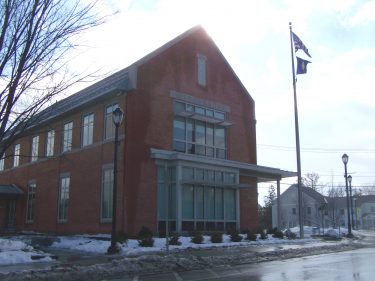It has been one year since a Vermont Superior Court ruling removed 13 percent of Victory’s voters from the town’s voter checklist, yet it appears the ruling has had little impact on other towns that could be facing similar issues.
At the center of exposing the voter fraud case was Tracey Martel, the town’s current clerk and treasurer. In March 2017 she ran for both offices and lost by less than four votes. After noticing that several individuals who voted in the election were likely not legal voters, she sued.

Victory Town Clerk Tracey Martel: “Some town clerks are very uneducated about our voting law. Maybe I need to speak up more. That’s why I believe there’s still a lot of work to be done.”
After reviews by the town Board of Civil Authority (BCA) and the ruling by Essex County Superior Court Judge Thomas J. Devine, 11 people who cast absentee ballots on Town Meeting Day 2017 were found to be second-home owners, not residents.
TNR Series: Voter Fraud Alleged in Victory
Martel told True North in a recent interview that the town’s democratic process has greatly improved since she won both the court case and a new election.
“After the court made the ruling the morale in town soared,” Martel told TNR. “It has been absolutely wonderful. We’ve seen more volunteers emerge, doing more things in town. We don’t have the sheriff’s department at our Selectboard meetings anymore; people are behaving and acting civilly. It has been night and day and the effect was immediate.”
She says she’s enjoyed her first year in office, and the town’s formerly inaccurate checklist is finally in order.
“We had more than 50 percent turnout last year,” she said. “Town Meeting was good with food, and folks were more neighborly — it really was night and day. I hope it stays like that.”
Beyond Victory
TNR reached out to more than a dozen other town clerks since January to see how the Victory ruling affected their election integrity processes. Just three responded.
Middlebury Town Clerk Ann Webster said she believes Addison County’s shire town has done a good job of “policing” the rolls — both before and after the Victory case.
Even before last year’s ruling, Webster made it a key part of her elected responsibilities to be open, honest and diligent about the town’s voting and election process.

Middlebury Town Clerk Ann Webster: “Middlebury has been fairly vigilant keeping our voter checklist up-to-date.”
“Middlebury has been fairly vigilant keeping our voter checklist up-to-date,” she said. “We send out challenge letters continually when we receive any documents that may indicate that a voter’s address has changed. This includes property transfers, notices from DMV, returned mail, college student graduation list, notices and articles in the newspapers. We also remove voters when we receive a death certificate to file or there is a notice in the newspaper. We may also send a challenge notice if we receive anecdotal information that a voter may have removed from the town.”
Webster said that during every odd numbered non-election year, members of the Middlebury Board of Civil Authority convene to review the checklist. She said the BCA sends challenge letters to anyone it cannot confirm is a town resident.
“Once we have challenged someone and we do not hear back from them, by law we have to wait until two general elections have passed and then we can remove the voter from the list,” she said.
Webster admits that determining the Vermont residency of individuals is difficult now that many individuals live in more than one state.
“In those cases we try to ascertain where they live the longest period of time, where they claim a homestead, and where they register their car,” she said. “[It’s] certainly not a perfect science, but registrants do swear to the accuracy of the information they are providing when registering to vote.”
When it comes to policing absentee ballots, where fraud may occur, Webster stressed that there’s confusion because of the many differences between the voting laws of various states.
“In Vermont an ‘absentee’ ballot or an ‘early’ ballot are pretty much the same thing,” she said. “There are several ways to receive a ballot for voting early, or you may come to the clerk’s office and vote early in person, but the process followed is the same from our end.
“There must be a request for the ballot, we must issue the ballot and we must then receive ballots back. Each part of the process is recorded in the statewide voter checklist system. It doesn’t matter if you are standing in front of me or you are a U.S. citizen living in France; we follow the same process.”
According to Webster, ballots must go out to military and overseas voters at least 47 days prior to Election Day. She added that it’s typical for U.S. citizens living abroad to vote during federal elections rather than for Vermont Town Meeting and other local elections.
“Middlebury does process many early ballots, which can sometimes be as high as 50 percent of turnout,” she said. “Unlike some other states, our early ballots are all processed on Election Day right along with all the ballots that are cast at the polls on that day. … In theory 100 percent of the turnout could be by early ballot as long as actual turnout does not exceed the number of registered voters on the checklist.”
Still, few officials in Vermont are concerned about voter fraud. Last week, writing in an op-ed, Secretary of State Jim Condos criticized voter roll purging and voter ID laws as a wrong response to “nonexistent, widespread voter fraud.”
TNR asked Webster if she took issue with the view that critics of voter fraud are against “voting rights,” and that their claims may be overblown, or even designed to undermine access to voting.
“I think that both sides tend to overreact and blow things out of proportion,” she said. “ … I would be more concerned with voter suppression being an issue rather than rampant voter fraud. In Middlebury, maybe a couple times over several years have we seen some incident that looks like possibly someone tried to vote more than once, but we are much more likely to see a voter return an extra ballot when a ballot clerk may have inadvertently handed out an extra one.”
Webster said she favors early voting despite problems reported in other states.
“I am in favor of same-day-voter registration,” she said, “but I am wary of trying to correct problems of voter suppression that we do not have.”
Other town responses
Sue Scott, town clerk in Salisbury, reported that she and other town clerks are well aware of the Victory case.
“I am aware of the Victory case regarding voter registration,” she said. “Just about a year ago, Will Senning, director of elections, sent out information answering questions he had fielded from town clerks regarding the outcome of the case. [However], I have not experienced any issues here in Salisbury.”
Scott said that she hasn’t noticed any changes in the number of absentee ballots submitted in local elections.
“The number of absentee ballot requests I received for both the August primary and the November general election were not in any way unusual,” she said. “The numbers were greater than for off-election years, but that is to be expected. In looking through my list of requests for absentee ballots, I see that they are from people who are long-time voters in Salisbury along with some newer voters who have recently moved into town and now reside here.”
Julie Delphia, town clerk for Leicester, said she is not noticing problems with absentee ballots in the Addison County town of about 1,100 residents.
Martel said although her fellow town clerks have discussed the Victory ruling, few have sought her out directly regarding fraudulent voting concerns in their communities.
“I just haven’t heard from many town clerks specifically about my court case,” Martel said. “I was at a recent conference and I chatted with a lot of different town clerks; they appeared supportive but that was about it.
“There was a group email sent around to all town clerks that mentioned students and voting. I was shocked by what one clerk wrote — she ignored what I have been saying about voting abuses. She wrote something to the effect that ‘wherever the heart is, is where you vote.’ Well, I sure don’t know where she got that kind of information.”
Martel added that she thinks other town clerks may not understand the vulnerabilities in Vermont’s voting system: “Maybe I need to speak up more. That’s why I believe there’s still a lot of work to be done.”
Lou Varricchio is a freelance reporter for True North Reports. Send him news tips at lvinvt@gmx.com.



New law in Vermont to start in July will require the requester of a copy of a birth certificate to prove who they are with a valid ID, doesn’t that discriminate against the most vulnerable of the State? This is supposedly a measure to protect your personal identifiable information, but I guess it is too much to ask for that same protection for our elections.
“too much to ask for that same protection for our elections.”
Well as said before voter photo ID, vote on voting day unless vet or disabled and if it was my call there’d be a IQ qualification but then a lot of congress would be left out…Seriously but Russia, Russia, Russia, Russia, Russia, Russia….
I can only imagine if they scrubbed the books in Chittenden County, but it will never happen
as there’s too much to lose, just look at the policies …………………..
Voter ID, ” Photo ID, Utility Bill ” No day of registration or mail-in ballot unless you’re in the
military or hospitalized !!
Voting in Vermont or anywhere in the USA will not be legitimate until voters are required to show by identification who they are when they vote. If you don’t have an ID (which is almost impossible today) the town clerk in any town USA should be required to furnish one for a nominal fee. Just a form stamped by the town seal along with a bill addressed to the voter presented prior to voting. If you are not intelligent enough to find out how to get an ID in today’s world, you probably shouldn’t be allowed to vote anyway. Just one man’s opinion, but it is time to clean up the voting process everywhere!
My new residence requires a government issues photo ID to vote. Last election I saw a lot more minorities there then I ever did voting in VT. Not a single person I saw complained in the least about having to provide identification.